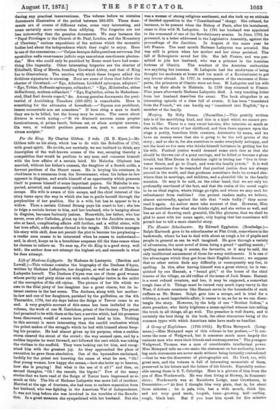For the King. By Charles Gibbon. 2 vols. (H. E.
Knox.)—Mr. Gibbon tells us his story, which has to do with the Rebellion of 1745, with great spirit. He avoids, not unwisely, we are inclined to think, any description of the well-known scenes of the war, escaping thereby a competition that would be perilous to any man, and concerns himself with the love affairs of a certain laird. Sir Malcolm Oliphant has married, without her father's consent, the daughter of a Scotch noble, a fervent partisan of the Stuart cause. He is levying his retainers, in obedience to a summons from the Government, when his father-in-law appears in disguise, and avails himself of an opportunity which presents itself to possess himself of some important papers. Sir Malcolm is sus- pected, arrested, and summarily condemned to death, but contrives to escape. His wife is aware of this escape, and the chief interest of the story turns upon the way in which she has to guide herself through the perplexities of her position. She is a wife, but has to appear to be a widow. Then a certain Colonel Strang pays his court to her ; she haa to feign a certain favour to him, and her husband, who is banging about in disguise, becomes furiously jealous. Meanwhile, her father, who has never, even after Culloden, given up his hopes for the Jacobite cause, is also at hand, complicating affairs still further, and a wilful sister, with her love affair, adds another thread to the tangle. Mr. Gibbon manages his story with skill, does not permit the plot to become too perplexing— a reader soon ceases to be interested when he ceases to understand— and, in short, keeps us in a breathless suspense till the time comes when he chooses to relieve us. To sum up, For the King is a good story, well told ; the anther does not attempt the highest art, and succeeds in what he does attempt.


































 Previous page
Previous page